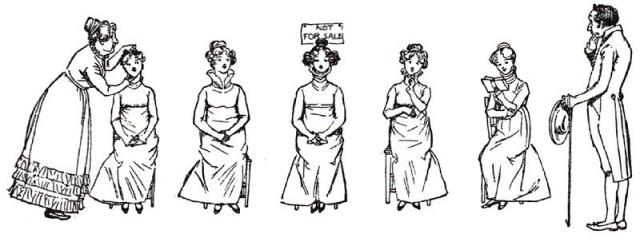"There is a broad consensus among philosophers of science that evolutionary psychology is a deeply flawed enterprise" (Stanford Encyclopedia of Philosophy)
Not content with annoying philosophers and scientists, though, the evolutionary psychologists seem to have decided to annoy those of us in the arts and humanities too. Recently some of them set out to uncover the "Mating Strategies Exemplified by Austen's Characters" (Kruger et al 199).
Their credibility was somewhat undermined by an early use of the world "natural":
Jane Austen is well known for her rich descriptions of female protagonists and their varied experiences in their quest for male partners (Harman, 2009), and thus, it seems natural to explore women’s mating strategies as depicted in her texts. (199)
Really? I'd have thought they'd want to distinguish between natural/biological influences on behaviour and nurture/social factors. That's perhaps a minor nitpick, but they also suggest that Austen had an "intuitive understanding of women's reproductive concerns" (199). I'm sure it suits their purposes to depict Austen as someone who was intuitively in touch with women's innate biological motivations: this would make her novels an invaluable source of primary information for them. I'm not sure what "Janeites" would feel about this, but I very much doubt it's a view which would find favour among "Austenites":
Michael Hayes
locates the difference between the two groups via discourse:It is also easy to recognize the legitimacy of two very different discourses: Janeite, which tends to be informal, intimate and personal accounts of her social and sentimental costume dramas, and Austenite, which is formal, intellectual and objective in its explication of her ironic, moral and subtle narratives that constitute a social and moral analysis. (221)
According to Hayes, the Janeite discourse is dependent on both personal narrative and period trappings, while Austenite interaction is marked by a more academically rigorous and formal evaluation of the same work. (Gross 4)
Moreover, I feel sure that those who "regard her as the most unflinchingly satirical of all great novelists" (Mullan) would be less than happy about these academics' assumption "that her characters should be immediately comprehendible to young adults, such that they would understand the various mating strategies the characters employ" (199).
Here's a description of the kind of research they undertook:
Men preferred the long-term strategist (Jane Bennett) to the flirty Lydia Bennett for both a long-term committed relationship and a short-term relationship, but did not have a preference for a one-night sexual relationship. Men preferred the short-term strategist (Maria Bertram) to the commitment-seeking Fanny Price for a one-night sexual relationship, but did not show a preference for other relationships. However, in a third comparison (Emma Woodhouse from Emma and Mary Crawford from Mansfield Park), men did not indicate any relationship preferences. (200)
This reads to me like a game of "marry, shag, kill". In this game
you have three people, and you have to decide wich of the 3 you would do what with. Shag, being the one night stand, marry, being you spend the rest of your life with them (which means you can shag them as many times as you want), and kill, I think is self explanatory.
Admittedly the academics left out "kill" but they seem to have replaced it with "a short-term relationship." What's really interesting to me is that
In both the preliminary and current study we decided that although Elizabeth Bennett is the central character, we chose to focus on her sisters Jane and Lydia because of their starkly contrasting personalities and mating strategies. (200)
In other words, they preferred to focus on the less nuanced characters. Would Elizabeth's success, that results from what might almost be called an anti-mating mating strategy, not have provided support for their theories? Furthermore, the graph in Figure 1 suggests that when it came to choosing between Jane and Lydia in the "shag" scenario, slightly more men chose Jane than Lydia, which was not really in line with the hypothesis
that participants’ ratings for a character’s attractiveness would be a function of the mating strategy the character exemplifies in the text, even when this information is excluded from the descriptive passage. (205)
They had "expected men to prefer Lydia [...] for non-committed sexual relationships" (207) but acknowledged that in the descriptive passage which the men read before making their decision
she is described very unfavorably. She is said to be ignorant, a poor listener, and unintelligent, all of which are negatively evaluated personality characteristics. It remains interesting, though, that although she is described so negatively, approximately half of the men preferred her for a hypothetical short-term and a brief, sexual relationship. (208)
What I find "interesting" is the fact that the men weren't being given a wide range of options. So, given a choice between a woman with an extremely unattractive personality and another whom one might reasonably doubt would consent to a "non-committed sexual relationship," opinions were split about which was the least-bad option. It certainly isn't a ringing endorsement of Lydia's mating strategy or, I would suggest, of the hypotheses underlying the approach of the academics carrying out the study.

----
Gross, Ursula Marie. "What Happens Next: Jane Austen's Fans and Their Sequels to Pride and Prejudice." MA thesis. Washington DC: Georgetown University, August 2008.
Kruger, D. J., Fisher, M. L., Strout, S. L., Wehbe, M., Lewis, S., & Clark, S. "Variation in Women’s Mating Strategies Depicted in the Works and Words of Jane Austen." Journal of Social, Evolutionary, and Cultural Psychology 7.3 (2013): 197-210.
Mullan, John. "Jane Austen is not that soothing: Suggestions that her fiction is an escape into a calmer, less crazy world miss the novels' stinging satire." The Guardian. 11 July 2013.
